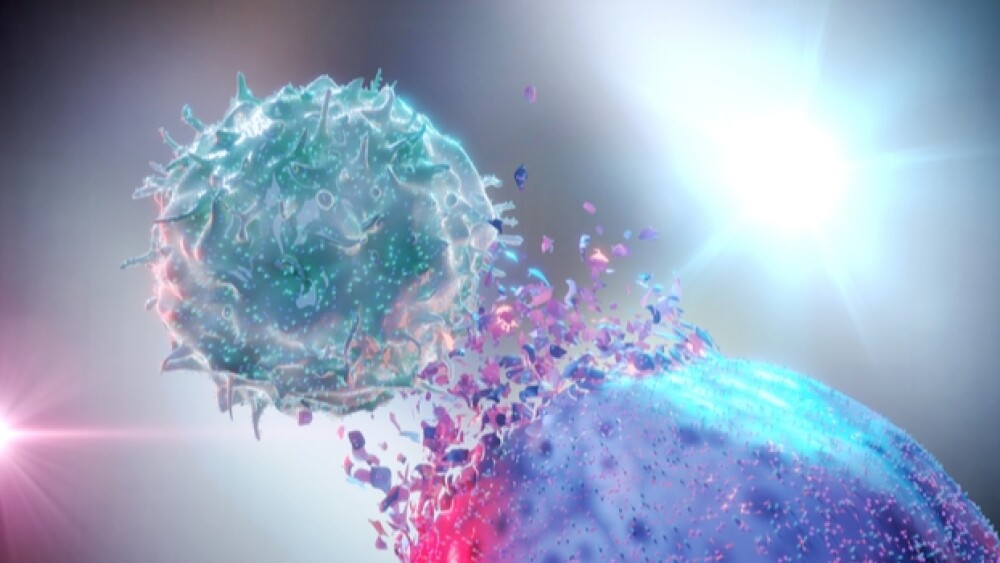Nkarta has treated its first patient in the first-in-human Phase I clinical trial of NKX101, an investigational immunotherapy designed to treat relapsed/refractory acute myeloid leukemia (AML) or higher-risk myelodysplastic syndromes.
Clinical-stage biopharmaceutical company Nkarta has treated its first patient in the first-in-human Phase I clinical trial of NKX101, an investigational immunotherapy designed to treat relapsed/refractory acute myeloid leukemia (AML) or higher-risk myelodysplastic syndromes (MDS).
The news follows directly on the heels of recent preclinical data presented at the Society for Immunotherapy of Cancer (SITC) 35th Anniversary Annual Meeting of the company’s other immunotherapy candidate NKX019, which is currently being investigated for B cell lymphoma and acute lymphoblastic leukemia. The company expects to file an Investigational New Drug Application for the drug in the first quarter of 2021.
NKX101, an “off-the-shelf” immunotherapy, uses natural killer cells obtained from the peripheral blood of healthy donors and is engineered with membrane-bound interleukin 15 and a chimeric antigen receptor (CAR) targeting NKG2D ligands found on tumor cells. This allows NK cells to recognize and neutralize tumor cells significantly better than non-engineered NK cells, at least in pre-clinical models.
In the ongoing open-label, 27-participant Phase I trial, Nkarta is evaluating the safety, pharmacokinetics and preliminary anti-tumor activity of NKX101. The investigational therapy will be administered as three weekly infusions during a cycle following lymphodepletion. All participants in the trial are adults living with relapsed/refractory AML or higher-risk MDS. The primary outcome measures include the incidence of treatment-emergent adverse events and the proportion of patients experiencing dose-limiting toxicities of the therapy. Additional secondary outcomes include the drug’s half-life, duration of persistence, evaluation of host immune response against NKX101 and objective response rate.
Patients with AML who relapse following front-line therapy are at high risk of experiencing poor outcomes, despite recent breakthroughs in treatment research, according to a statement made by Carlos Bachier, M.D., Director of Cellular Therapy Research, Sarah Cannon Research Institute and Program Director for Sarah Cannon Center for Blood Cancer at TriStar Centennial Medical Center in Nashville, Tennessee.
“To date, the significant clinical benefit achieved with CAR T cell therapies in the treatment of B cell lymphomas and acute lymphocytic leukemia has not extended to AML or other myeloid malignant disorders,” Bachier said. “The investigation of NKG2D-targeting and the tumor-killing potential of an engineered innate immune cell type is a promising new approach.”
Nkarta’s Chief Medical Officer Kanya Rajangam, M.D., Ph.D., noted that a robust body of academic research has demonstrated increased expression of NKG2D targets in the context of AML and other cancers. Additionally, this research has demonstrated clinical responses in patients with relapsed/refractory AML who received non-engineered allogeneic NK cells as a treatment in some single-center studies.
“With its amplified NKG2D targeting and enhanced NK cell engineering,” added Dr. Rajangam, “NKX101 has the potential to improve upon this earlier clinical experience with non-engineered NK cells and to activate a deep and robust immune response in AML patients.”
A poster on the NKX101 trial’s design will be presented at the 2020 American Society of Hematology Annual Meeting and Exhibition on December, 6, 2020, during Session 616 and under Abstract 1040 titled, “A Phase 1 Study of NKX101, an Allogeneic CAR Natural Killer (NK) Cell Therapy, in Subjects with Relapsed/Refractory (R/R) Acute Myeloid Leukemia (AML) or Higher-Risk Myelodysplastic Syndrome (MDS).”
On the same day of announcing it has dosed its first patient in the NKX101 trial, Nkarta also reported financial results for its third quarter of 2020. According to the report, Nkarta has approximately $330.2 million of cash and cash equivalents, which the organization says should fund operations into the second half of 2023.





